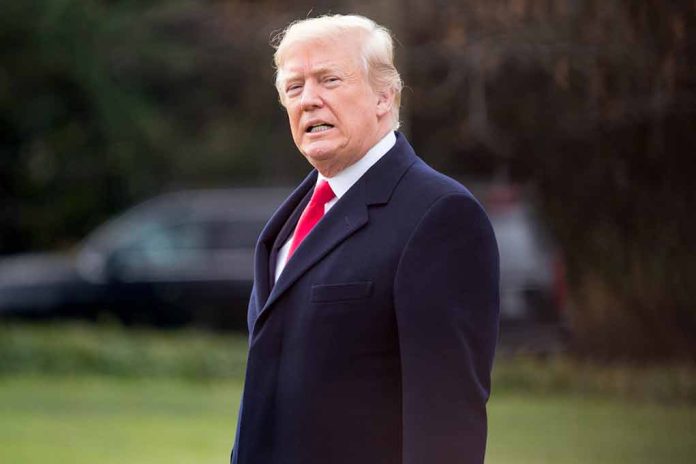
Former President Donald Trump sues CBS News for $10 billion, alleging deceptive editing in a “60 Minutes” interview with Vice President Kamala Harris.
At a Glance
- Trump files a $10 billion lawsuit against CBS News over alleged deceptive editing.
- The lawsuit claims CBS engaged in “malicious, deceptive, and substantial news distortion.”
- Trump’s legal team demands CBS release the full transcript of Harris’s interview.
- CBS maintains the interview was not doctored and stands by its editorial decisions.
- The case highlights the contentious relationship between media and political figures.
Trump’s Legal Action Against CBS News
Former President Donald Trump has taken a bold step in his ongoing battle with the media by filing a $10 billion lawsuit against CBS News. The lawsuit, filed in the Northern District of Texas, Amarillo division, alleges that the network engaged in deceptive editing of a “60 Minutes” interview with Vice President Kamala Harris. Trump’s legal team argues that this editing was intended to favor the Democratic Party and mislead the public, potentially influencing the upcoming 2024 presidential election.
The lawsuit focuses on a specific exchange between Harris and CBS correspondent Bill Whitaker about Israeli Prime Minister Benjamin Netanyahu. Trump’s attorneys claim that CBS’s editing of this segment amounted to “malicious, deceptive, and substantial news distortion” designed to interfere with the electoral process.
Demands and Allegations
At the core of Trump’s legal action is a demand for CBS to release the full transcript of the interview with Vice President Harris. The network has refused, citing First Amendment protections. This refusal has only fueled Trump’s allegations of media bias and manipulation.
Trump’s legal team argues that media outlets have a duty to faithfully convey the truth of events, and they claim that CBS failed in this obligation. The lawsuit seeks a jury trial and at least $10 billion in damages, a figure that underscores the gravity with which Trump views the alleged offense.
CBS’s Response and Media Reaction
CBS News has strongly refuted Trump’s claims, maintaining that the interview was not doctored and that Harris’s full response was aired in two parts due to time constraints. The network stands by its editorial decisions and the integrity of its reporting.
Legal experts have criticized the lawsuit as frivolous and a potential violation of First Amendment principles. Some have pointed out that Trump has a history of filing lawsuits against media organizations, with previous defamation cases against CNN, The Washington Post, and The New York Times, which he lost.
Implications for Media-Politics Relations
This lawsuit underscores the increasingly contentious relationship between media outlets and political figures, especially in the lead-up to major elections. Trump’s legal action, filed just six days before Election Day, has reignited debates about media bias, journalistic integrity, and the role of the press in a democratic society.
The case also highlights Trump’s ongoing strategy of challenging media narratives through legal means. His threat to revoke CBS’s broadcast license, along with those of other networks critical of him, raises concerns about potential attempts to influence media coverage through legal pressure.
As this legal battle unfolds, it will undoubtedly continue to shape the discourse around media freedom, political accountability, and the boundaries of journalistic practice in covering high-stakes elections.
Sources:
- Trump sues CBS News for $10 billion alleging ‘deceptive doctoring’ of Harris’ ’60 Minutes’ interview
- Trump files $10 billion lawsuit against CBS News over Kamala Harris interview
- Trump Files $10 Billion Lawsuit Against CBS News Over Deceptive Editing in Harris’ ‘60 Minutes’ Interview
- Trump sues CBS News for $10B alleging ‘deceptive doctoring’ of Harris’ ‘60 Minutes’ interview
- Trump sues CBS News over 60 Minutes interview with Harris; network says suit is “completely without merit”










